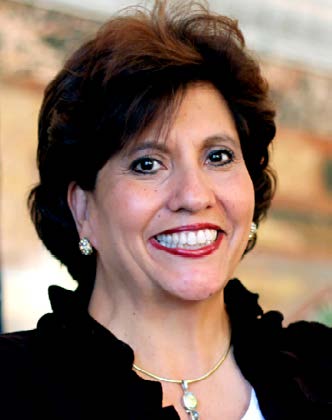|
Message from the Chief
 Chief Circuit JudgeMary H. Murguia Chief Circuit JudgeMary H. MurguiaThe 2024 Ninth Circuit Annual Report profiles the U.S. Court of Appeals for the Ninth Circuit and the federal district and bankruptcy courts in the nine most western states, including Alaska, Hawaii, the Commonwealth of the Northern Mariana Islands and the U.S. Territory of Guam.
Looking back on 2024, I remain grateful for and impressed by the commitment of those working for and with the Ninth Circuit to support the administration of justice in the West. My role as chief judge allows me the opportunity to serve this circuit as presiding judge of the 11-judge en banc court, and as chair of both the Executive Committee of the U.S. Court of Appeals and the Judicial Council of the Ninth Circuit – the policy making bodies within this circuit. Additionally, I represent this circuit at various national meetings and events, including at the Judicial Conference of the United States (JCUS), the national policy making body of the federal courts.
As chief, I also have the privilege to report on the venerable work and judicial milestones occurring within our circuit. It is my honor to acknowledge the judges we welcomed and those we lost in 2024. Congratulations and welcome to District Judges Amy Baggio, Dena M. Coggins, Michelle Williams Court, Anne Hwang, Mustafa T. Kasubhai, Krissa M. Lanham, Eumi K. Lee, Angela M. Martinez, Shanlyn A. S. Park, Rebecca L. Pennell, Kirk E. Sherriff, Micah W.J. Smith, Cynthia Valenzuela and Noël Wise; Bankruptcy Judge J. Barrett Marum; and Magistrate Judges Maximiliano D. Couvillier III, Chi Soo Kim, Sean C. Riordan, and Benjamin J. Cheeks, who was appointed a U.S. district judge in January 2025. Their biographies are available starting on page 8 of this report. In 2024, we also saw the passing of several judges throughout the circuit. We will miss Senior District Judge Larry R. Hicks, District of Nevada; Senior District Judge Alan C. Kay, District of Hawaii; Senior District Judge Justin L. Quackenbush, Eastern District of Washington; and Magistrate Judge Patricia V. Trumbull (Ret.), Northern District of California. These judges impacted us throughout their storied judicial careers, and a tribute to those judges begins on page 19.
The circuit also welcomes several new chief district judges: Dolly M. Gee, Central District of California; Andrew P. Gordon, District of Nevada, Michael J. McShane, District of Oregon; Troy L. Nunley, Eastern District of California; and Jennifer G. Zipps, District of Arizona. In addition to their judicial duties, chief judges serve a critical role in the management and the administration of justice in their respective courts.
Many of our judges received awards for their exceptional service, leadership and commitment to our justice system. See page 23 for a listing of awards.
In addition to acknowledging our judges, I also commend the many professionals who support the judges and assist with administrative management of this circuit’s immense workload. Our court of appeals continued to be the nation’s busiest federal appellate court, accounting for 20.5% of all new appeals nationally, with 8,145 appeals, up 4.6% from fiscal year 2023. There were 64,409 new filings in our district courts, up 15.2% from fiscal year 2023. Bankruptcy filings numbered 83,597, up 25.6% from the previous year, well above the national increase of 16.2% in bankruptcy filings.
This report provides further detailed statistical summaries and emphasizes important events and trends that span the 15 district courts in our circuit, including the 2024 Ninth Circuit Judicial Conference in Sacramento, California, which brought together judges and lawyers from around the circuit. Highlights included visits by U.S. Supreme Court Justice Elena Kagan and Senior Associate Justice Anthony M. Kennedy, who addressed the audience on the value of civility in the courts, and Judge Robert J. Conrad, director of the Administrative Office of the U.S. Courts, who emphasized teamwork in the pursuit of excellence in the administration of justice. You can read more about the Conference on page 29.
During the Conference, we also celebrated the winners of the 2024 Ninth Circuit Civics Contest. The Public Information and Community Outreach (PICO) Committee sponsors this contest annually for high school students across our circuit. The winning essay and video submissions for the 2024 theme, “When Duty Calls: Why Exercising the Rights and Responsibilities of Citizenship is Important to Me,” can be found on the civics contest website.
We remain committed to promoting civics education programs across our circuit and nationally. To this end, the PICO Committee held a first-of-its-kind online Community Outreach Symposium wherein civics coordinators, judges, court staff, special guest judges from other circuits and invited educators gathered to review civics education activities and resources across the circuit. This Symposium informed our dedicated civics coordinators who work diligently to facilitate outreach events in various forms, including teachers’ institutes and mock trials at our courthouses. See page 26 for details.
Many judges in the Ninth Circuit also participated in programs aimed at helping defendants reintegrate into society, and this work does not go unnoticed. One example is the Sobriety Treatment and Education Program (STEP) reentry program in the Eastern District of Washington. See page 27 for details.
This annual report provides additional details on the great work of our Ninth Circuit judges, staff and the legal community. It is an honor to collaborate with these colleagues who tirelessly support the administration of justice. I want to extend my sincerest gratitude for their commitment to public service and civic responsibility. I hope that this report provides you with helpful information about the immensely important work that we accomplished in 2024.
Back to Top
|
|

